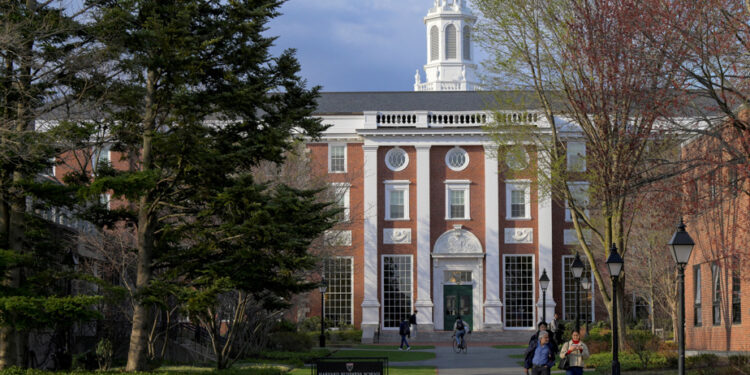The showdown between the Trump administration and the universities continues. At the heart of tensions: positive discrimination and orientation deemed too “Woke” of elite establishments in the United States. A cultural battle announcing deep changes on campuses.
To compensate for the “crawling” appeal to “open and hidden” practices of racial discrimination, President Donald Trump signed a new decree last week to demand more data from universities, including the ethnicity of students and their results to tests, to ensure for example that black candidates do not benefit from special measures to promote their access to higher education.
“Placing the lower bar for candidates because they come from a disadvantaged environment is perfectly legal and justifiable,” explains Edward Blum, founder of the organization Students for Fair Admissions. “As long as this bar is placed in the same place for students in northern Maine, where I live, as for those of a rural environment in Missouri and those in regions where there are few African Americans or Hispanics. »»
Positive discrimination
Mr. Blum has campaigned for many years to have positive discrimination measures recognized as illegal in the evaluation of university admission files. He won the case before the Supreme Court in 2023.
Since then, universities can no longer legally take into account the ethnicity of a candidate who wants to study in one of their programs.
The majority of American universities and colleges use various measures to assess applications: tests, tests, academic results, parascolary involvement, explains Harry Feder, executive director of Fairttest. The group militates against standardized tests, arguing that they do not adequately reflect the value of a candidate.
Universities could be tempted to base themselves more on standardized tests, to avoid being accused of having taken into account ethnicity and thus ending up in the Trump administration line. “In which case, the student body will end up being made up of people from privileged backgrounds,” he predicts.
Two visions
“We live in two different understandings of society,” comments Virginia Sapiro, a professor emeritus at the University of Boston. On the one hand, those who plead to take into account the legacy of slavery, unconscious biases and social iniquities. “It is almost impossible to be meritocratic by making yourself believe that it does not exist,” adds Mr.me Sapiro, specialized in higher education and theory of democracy.
In the other camp, the defenders of a system based on individual merit, for which the fact of taking into account ethnicity, regardless of reason, is discriminatory.
“The arguments trying to find structural factors in society rather than assessing the individual merit of a person are mistaken,” said Adam Kissel, of Trinity University.
You have to look at the merit of each person and regardless of the result, if there are problems in the kindergarten system at 12e year or in family policies or elsewhere, this is where you have to act. Not in higher education admissions by evaluating them with a racial perspective.
Adam Kissel, Professor at Trinity University and Researcher in Heritage Foundation Education
Mr. Kissel is a researcher at the Heritage Foundation education, the conservative group behind Project 2025, who details the measures to be taken by the American administration to put his values from the front.
Many decisions of the Trump administration are taken from this document, such as the withdrawal of all fairness, diversity and inclusion policies (EDI) from all institutions receiving federal funds.
The Secretary of Education, Linda McMahon, denounced many occasions the importance given to EDI policies and the “woke” culture in schools.
“What is at stake for us is not only a reform of higher education, but its dismantling, to replace it with a specific ideological program”, denounces Lynn Pasquerella, president of the American Association of Colleges and Universities.
Disputes
Dozens of education prosecutions have been filed against the government since the arrival of Donald Trump in January. Some dispute the withdrawal of EDI programs, others denounce the freezing of the federal funds promised to universities.
The Harvard University filed in April a prosecution against the government to oppose a freezing of 2.6 billion US of funding, by denouncing the impact on scientific advancement. The government demanded certain reforms, citing problems of anti -Semitism on the campus.
The Trump administration justified its position by its legal obligations of protection against discrimination.
Agreements
Other universities in a similar situation have signed an agreement with the government. Colombia agreed at the end of July to pay 200 million US, without admission on his part, over 3 years, to receive its funding. Brown University has agreed to pay US 50 million over 10 years.
Academics have denounced the situation, fearing that the government will be galvanized by these agreements.
“I understand that, from their point of view, the decision -makers in Columbia probably thought they were doing what was necessary to obtain the funds and to be able to continue their research,” said Katy Glenn Bass, research director at the Knight First Amendment Institute, attached to Columbia. She co -signed a letter to denounce “an extortion campaign” from the government.
We think that it will be very damaging for the autonomy of our university and for our academic freedom.
Katy Glenn Bass, research director at the Knight First Amendment Institute
Previously, the government would rather have tried to find a solution to a problem by working in concert with university management, without applying a measure having repercussions throughout the university community – including researchers in neuralgic sectors, explains Kenneth Wong, professor of education and political science at Brown University.
“We see a fundamental change in the relationship between higher education establishments and the federal government,” he says.



